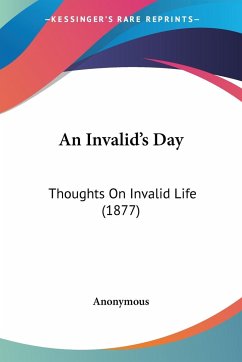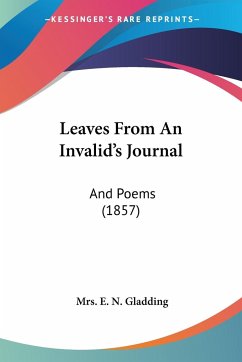
An Invalid's Day
Thoughts On Invalid Life (1877)

PAYBACK Punkte
10 °P sammeln!
An Invalid's Day: Thoughts On Invalid Life (1877) is a book written by an anonymous author that explores the experiences and challenges of living with a chronic illness or disability. The book is a collection of reflections and observations on the daily struggles faced by those who are unable to participate fully in society due to their physical limitations. The author discusses the emotional toll of being an invalid, as well as the impact on relationships with family and friends. The book also offers practical advice on how to cope with the limitations imposed by illness or disability, includ...
An Invalid's Day: Thoughts On Invalid Life (1877) is a book written by an anonymous author that explores the experiences and challenges of living with a chronic illness or disability. The book is a collection of reflections and observations on the daily struggles faced by those who are unable to participate fully in society due to their physical limitations. The author discusses the emotional toll of being an invalid, as well as the impact on relationships with family and friends. The book also offers practical advice on how to cope with the limitations imposed by illness or disability, including tips on managing pain, finding joy in small moments, and maintaining a positive outlook. An Invalid's Day provides a unique perspective on the lived experience of chronic illness and disability, offering insight into the physical, emotional, and social challenges faced by those who are often marginalized by society.This scarce antiquarian book is a facsimile reprint of the old original and may contain some imperfections such as library marks and notations. Because we believe this work is culturally important, we have made it available as part of our commitment for protecting, preserving, and promoting the world's literature in affordable, high quality, modern editions, that are true to their original work.












